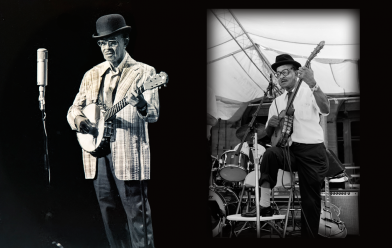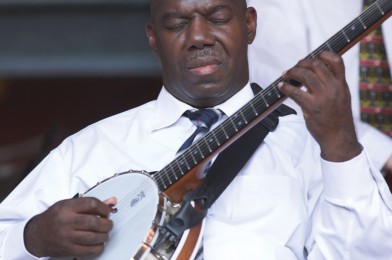It’s been a long time coming, but the Danny Barker Guitar and Banjo Festival is finally debuting in New Orleans this week with concerts, seminars, workshops, and jam sessions in venues across the city.
The festival, organized by guitarist Detroit Brooks and his dedicated committee, will bring attention to guitars and banjos, two important instruments that are often neglected in the traditional jazz pantheon.
Above anything though, the aim is to honor the legacy of the late Danny Barker, a NEA Jazz Master that was much more influential than most people know.
Barker played with such greats as Sidney Bechet and Jelly Roll Morton, and he helped launch the careers of Dr. Michael White, Wynton Marsalis, and countless others.
The festival will kick off this Tuesday, on Barker’s birthday. There will be tribute concerts at Snug Harbor at 8 p.m. and 10 p.m. with performances by Greg Stafford, Lucien Barbarin, Herlin Riley, Jesse Boyd, Steve Masakowski, Detroit Brooks, and special guests.
The following evening brings a seminar hosted at Cafe Rose Nicaud by Barker’s friend and biographer, Kalamu ya Salaam. It will take place from 6 p.m. to 9 p.m.
On Thursday, Seva Venet and Carl LeBlanc, local musicians influenced by Barker, will be featured at a guitar and banjo clinic held in UNO’s in Performance Arts Room 103 from 1-2:30 p.m. There will be a similar clinic Saturday, location to be announced.
Friday evening will be jam-packed, beginning with a fundraising extravaganza at the Carver Theater from 6 p.m. to 11 p.m.
The event is sure to be a raging success, featuring performances by the Treme Brass Band, the Plum Magnetic Band, the UNO Jazz Ensemble, John Boutte, and plenty of others. Special guests include Charmaine Neville, Kanaka Fuwa, Cindy Scott, and Greg Stafford. There will be musician meet-and-greets and special “Danny & Blu Lu” (Barker’s wife) sandwiches.
And the night doesn’t end there.
The Carver Theater concert will be followed by a late-night jam session at Snug Harbor. It will start after midnight and feature June Yamagishi, Chris Thomas King, Grant Green, Thaddeus Richard, Leo Nocentelli, Raymond Weber, and Donald Ramsey.
After all this, make sure to wake up on Sunday at Bullet’s Sports Bar, because the music picks up again at 11 a.m. The Hot 8 Brass Band, Kid Merv & All That Jazz, the Lucien Barbarin Band, Steve Pistorius, Greg Stafford and the Jazz Hounds, and Kermit Ruffins will light up the stage until 6 p.m.
Barker was an exemplary role model for the younger generation of jazz musicians.
“We’re trying to bring attention to all the contributions Danny Barker has made.” Brooks said. “Danny spent a long time teaching the youth not just about guitar, but how to present themselves as human beings. He had a lot of great attributes that he reflected back into New Orleans culture.”
Kenneth Ferdinand, another pivotal festival organizer, expanded upon Barker’s importance in the context of the Civil Rights Movement, when the term “Dixieland Jazz” had fallen out of favor because of its widely perceived ties to white supremacy.
“It was a derogatory term,” Ferdinand said. “It was a term that was associated with minstrels. Blackface. With all of that. So a lot of the young musicians just refused to play it. They refused to have anything to do with Dixieland. It was complex to us, so we just fell away from playing it.”
Ferdinand recalls his own high school days, playing in the band at St. Augustine High School.
“We were chided for playing for traditional music, and we were not taught of the accomplishments, of the musical accomplishments, of many of the African American musicians and artists who played that music,” he said. “We had no reverence for Louis Armstrong at the time. You know, you’d watch him on the Ed Sullivan show, and he was wonderful, he was entertaining, but you really weren’t watching him because you wanted to experience Louis Armstrong’s ‘chops,’ as they call them. His technique, his presentation, and all that. We were discouraged from appreciating all that about Louis Armstrong.”
According to Ferdinand, Danny Barker was the one that made the change in the eyes of the young musicians.
“When Danny came through, I remember him saying to us, he essentially said that we should not decline, we should not refuse our traditions,” he said. “The traditions are rich. The traditions were not just music that undermined the dignity of African American people. They were not just ‘skinnin’ and grinnin’.’ There was a rich music that was traditional, that we as young musicians ought to support, ought to honor, ought to get involved with. Danny changed the reference from ‘Dixie music’ to ‘traditional,’ what we now call trad jazz. There’s more trad jazz today than there ever was in the last 40 years, and that’s because at last we are able to go back to our roots and not have our music be distorted and mischaracterized by terms like Dixieland.”
The Wonderful World of Jazz Foundation in Japan has been extremely supportive of the cause, donating five banjos that the Danny Barker Festival committee will give away to young students that show a strong interest in learning the instrument.
Brooks and team have been working tirelessly to get everything together, but the plans don’t end this weekend. They’re already getting excited about next year’s festival.
“The first time for a festival is difficult,” Ferdinand said. “like a baby coming out of the womb, but this is step one. Next year is gonna be 10 times the size.”
They’re also talking about putting together a similar event in honor of Sidney Bechet.
Above all, Brooks has plans to take a leaf out of Barker’s book and educate the next generation about traditional jazz.
“That’s our purpose, trying to attract the youth and make them realize why they’re playing that music,” Brooks said. “Trying to help them develop an understanding of what they’re doing so they can know where they’re going.”
He’s recently been in touch with Benny Pete, of the Hot 8 Brass Band, to discuss setting up conferences, seminars, and other ways to get the attention of young musicians.
According to Brooks and Ferdinand, it’s especially important to preserve the tradition, educate youth, and help them take control of the music business in a city like New Orleans. Music is the economy’s foundation, and local musicians so often get the short end of the stick when outsiders come in to co-opt tradition.
“The young musicians need to know that they’re the future of this music, and we need to make it a business,” Ferdinand said. “And we need to have control of this empire we have. That’s what this is all about. It’s not about another festival. We’ve got all kinds of festivals. This is more.”
So come on out this week and be a part of it all. You’ll hear some great music and get a chance celebrate and learn more about a man we’re all indebted to.
“We’re trying to bring attention to all the contributions he’s made,” Ferdinand concludes. “We’re trying to get people to respect him and give him the recognition he deserves. He taught us that playing traditional music doesn’t make us minstrels. We are more than entertainers. We are committed to this art, to this creativity.”
For more information and a full schedule of events, visit http://www.dannybarkerfestival.com.






